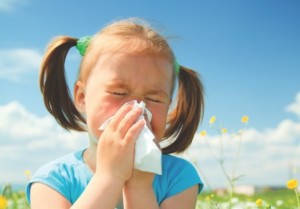A lot of children pick up colds and the sniffles from school and daycare. But in a city like Charlotte, where allergies can be intense, how can you tell if your child has a cold or is developing allergies, and how should you have them treated if it is allergies? Dr. Michael T. Falcone of Charlotte Eye Ear Nose & Throat Associates, P.A. joins us this month to discuss diagnosing and treating allergies in children.
What’s the earliest age you see children develop allergies? Can even infants have allergies?
Environmental allergies can develop at any age. Generally at about 3 years of age one can start to see the development of environmental allergies. They can begin earlier, but it is challenging to distinguish allergies from common colds in toddlers.
What are some common signs of allergies parents should watch out for?
Common symptoms include fairly constant nasal congestion, watery discharge, eye irritation, and sneezing. In other words, similar symptoms you’d find in adults.
Children often come home from day care with runny noses and colds. How can you tell the difference between regular sniffles and allergies?
Allergies do not cause a fever. Colds can, but not always. Irritability and disturbed sleep are more common in colds. Colds typically resolve in 7-10 days, whereas allergies are more ongoing. Colds are also less likely to respond to antihistamines.
When should parents ask a pediatrician about allergies? When should they see a specialist?
Parents should ask their pediatrician about allergies when it seems their child always has a cold, meaning they have ongoing allergy symptoms. Children could see a specialist at any point but that would be more recommended if their symptoms fail to improve with allergy medications.
Can children take allergy medicines like Claritin or nasal sprays? Should they?
Children can take age-appropriate allergy medications as listed on the packaging. Infants are unlikely to have environmental allergies and do not need to take allergy medications.
Is there anything parents can do to prevent their children from developing allergies? Should they keep the house clean, or keep pets away from their children, or does early exposure to dust and dander help them develop immunities?
Environmental allergies can be inherited. However, many develop spontaneously. It is not clear if early exposure to pets prevents or predisposes them to the development of allergies. If you have a strong family of allergies and your child has symptoms of allergies, chances are they have allergies.
Do children ever outgrow their allergies?
People can outgrow their allergies, but they can also develop new ones.
Can children receive allergy shots (immunotherapy)?
Yes, they can. Typically children at least 6 years old can be candidates for allergy shots. Another option is allergy drops that go under the tongue.
 Dr. Falcone is a comprehensive otolaryngologist who attended the University of Florida for his undergraduate degree and the University of Florida College of Medicine for his medical degree. His internship and residency were at Vanderbilt University Medical Center. He practices in our University office.
Dr. Falcone is a comprehensive otolaryngologist who attended the University of Florida for his undergraduate degree and the University of Florida College of Medicine for his medical degree. His internship and residency were at Vanderbilt University Medical Center. He practices in our University office.
![]()
Charlotte Eye Ear Nose & Throat Associates



